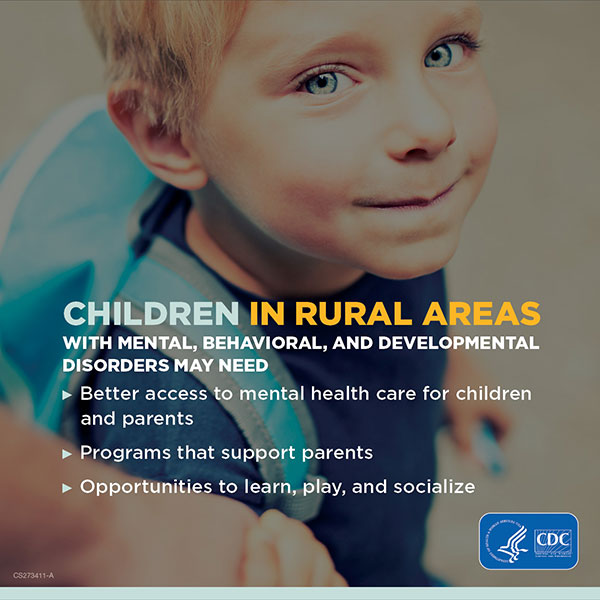Working together, we can help children in rural communities thrive

When children grow up in a safe and nurturing home environment, have opportunities to learn, and time to interact and build relationships with other children, they are more likely to reach their full potential. This is especially true for children with mental, behavioral, and developmental disorders.
Mental, behavioral, and developmental disorders, such as anxiety, attention-deficit/hyperactivity disorder or ADHD, and learning problems, often begin in early childhood and can affect life-long health and well-being. Children with these disorders face challenges at home, at school, and with friends. About 1 in 7 U.S. children aged 2-8 years have a mental, behavioral, and/or developmental disorder reported by a parent.
Previous research has shown that children with mental, behavioral, and developmental disorders and their families face personal, financial, and neighborhood challenges more often than families of children without these disorders. These challenges may make it harder for some parents to give their child the resources they need to thrive. The type of community that families live in, urban versus rural, may increase these challenges.
To better understand the differences between urban and rural areas, Centers for Disease Control and Prevention (CDC) researchers collected information from parents on children’s mental health in both urban and rural areas. Parents were asked questions about their child’s mental health, their own mental health, their neighborhood, and other personal and community factors.
Parents of children with mental, behavioral, and developmental disorders in rural areas (isolated, small rural, and large rural areas combined) more often reported having trouble getting by on their family’s income than parents of children with these disorders in urban areas. Regardless of poverty level and race/ethnicity, these parents more often rated their own mental health or their partner’s mental health as “fair” or “poor;” they also more often reported living in a neighborhood in poor condition and without amenities, such as parks, recreation centers, and libraries. To overcome these challenges, children and their parents living in rural communities may need additional support.
Children with mental, behavioral, and developmental disorders can benefit from better access to mental and behavioral health care, programs that support parents and caregivers, and opportunities to learn, play, and socialize.1,2,3
What might help families and their children?
States that
- Support the delivery of affordable mental and behavioral health care to families.
- Foster policies and programs to alleviate financial hardships for families.
- Expand neighborhood amenities where they are lacking to allow children to play, read, and socialize.
Healthcare systems that
- Collaborate with early learning programs, parenting and caregiver support programs, and primary care clinicians to help improve access to mental and behavioral health care, and community social and recreational resources.
- Explore ways to deliver affordable mental and behavioral health care services for parents and children, such as integrating these services into primary care settings and schools, as well as using telehealth technology.
Primary care clinicians that
- Connect families with mental and behavioral health care, parenting and caregiver support programs, and early learning programs.
- Screen parents for stress, depression, and other mental health problems to help connect parents to the right resources.
What is CDC doing?
CDC’s National Center on Birth Defects and Developmental Disabilities (NCBDDD) is committed to helping children with mental, behavioral, and developmental disorders and their families get the support they need. NCBDDD studies mental health and developmental disabilities, identifies factors that put children at risk for these conditions, and informs state and local decision-makers and other stakeholders, so that children and families can get the support they need as early as possible.
References
- National Academies of Sciences Engineering and Medicine. (2016). Parenting Matters: Supporting Parents of Children Ages 0-8. Washington, DC: The National Academic Press.
- National Research Council and Institute of Medicine. (2009). Preventing Mental, Emotional, and Behavioral Disorders Among Young People: Progress and Possibilities. (M. E. O’Connell, T. Boat, & K. E. Warner Eds.). Washington, DC: The National Academic Press.
- U.S. Department of Health and Human Services, US Department of Education, US Department of Justice. (2000). Report of the Surgeon General’s Conference on Children’s Mental Health: A National Action Agenda. Washington, DC: Department of Health and Human Services.


































No hay comentarios:
Publicar un comentario